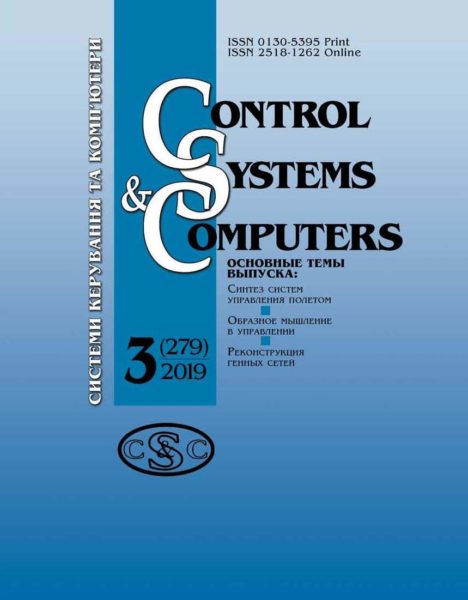Control Systems and Computers, N1, 2017, Article 7
DOI: https://doi.org/10.15407/usim.2017.01.068
Upr. sist. maš., 2017, Issue 1 (267), pp. 68-76, 85.
UDC 004.891.3
V.М. Levykin, O.V. Chalaja
Model of lifecycle of knowledge-intensive business process
1 – Doctor of Engeneering Science, Kharkiv National University of Radio Electronics, Lenin av., 14, 61166, Kharkiv, Ukraine, E-mail: levykinvictor@gmail.com,
2 – PhD of Econ. Sc., Kharkiv National University of Radio Electronics, Lenin av., 14, 61166, Kharkiv, Ukraine, E-mail: oksana.chala@nure.ua.
Introduction. The problem of managing a lifecycle of the knowledge-intensive business process is considered. The lifecycle of a business process consist of the sequence of stages from initial concept considering to completion of use. The lifecycle need to be adjusted by a change of goods and services or requirements for them. The problem is that knowledge workers change knowledge-intensive business process at runtime using their personal knowledge. Therefore it is necessary to adapt the model of such a process at runtime.
Purpose. The purpose of this article is to develop a model of the lifecycle of the knowledge-intensive business process which would provide an opportunity to improve the process after the completion of the currently executing instance, and while it is running. This will give a possibility to improve the efficiency of process management for the current instance of the process through the use of personal knowledge of workers in the process model.
Methods. An evolutionary approach to building the lifecycle of a knowledge-intensive business process is used. The approach takes into account the evolution of the requirements. It is based on a combination of waterfall and evolutionary strategies. The waterfall strategy provides a model of the process after all of the apriori known requirements to the process are satisfied. Evolutionary strategy focuses on iterative empowerment of the model by incorporating new base dependencies that was identified during the implementation of the business process. The dependencies reflect the previously unknown relationship between the artifacts of a context and the activities of the business process.
Results. The model of the process lifecycle in relation to the knowledge-intensive business processes is improved. The model includes phases of analysis, re-engineering, deployment and use of the business process. The sequence of the lifecycle phases implements the waterfall strategy. Evolutionary strategy is implemented in the use phase.
Conclusion. The proposed model differs in that the adaptation and improvement of the business process is executed in parallel with its implementation. It is based on the identification of new relationships between actions and objects used by the process. The combination of data and process mining techniques can be used to identify such dependencies. The approach leads to increase the adequacy of the process model, and as a result, the process control can improve efficiency.
Keywords: knowledge-intensive business process, model of lifecycle, process model, knowledge.
- Eliferov, V.G., Repin, V.V., 2004. Biznes-processy: Reglamentacija i upravlenie, M.: INFRA-M, 319 p. (In Russian).
- Vom Brocke, J., Rosemann, M., 2015. Handbook on Business Process Management 1. Introduction, Methods, and Information Systems,, Springer-Verlag, Berlin, Heidelberg, 709 p.
- Weske, M., 2012. Business Process Management: Concepts, Languages, Architectures, 2nd ed. Springer-Verlag, Berlin, Heidelberg, 403 p.
https://doi.org/10.1007/978-3-642-28616-2 - Vom Brocke, J., 2015. Handbook on Business Process Management 1. Introduction, Methods, and Information Systems, Berlin: Springer-Verlag, 709 p.
- Gronau, N., 2012. Modeling and Analyzing knowledge intensive business processes with KMDL: Comprehensive insights into theory and practice (English), Gito, 522 p.
- Gronau, N. Thim C., Ullrich, A., Vladova, G., Weber, E., 2016. “A Proposal to Model Knowledge in Knowledge-Intensive Business Processes”. BMSD 2016. Proceedings of the Sixth International Symposium on Business Modeling and Software Design, 20-22 June, Rhodes, Greece, 16, pp. 98–103.
- Langley, G.J., Moen, R.D., Nolan, K.M., Nolan, T.W., Norman, C.L., Provost, L.P., 2009. The Improvement Guide: A Practical Approach to Enhancing Organizational Performance, 512 p.
- Van der Aalst, W.M.P., 2016. Process Mining: Data Science in Action Aalst, Springer-Verlag, Berlin, 466 p.
https://doi.org/10.1007/978-3-662-49851-4 - Van der Aalst, W. M. P., 2014. “Process Mining in the Large: A Tutorial. Business Intelligence”, Springer Science + Business Media, pp. 33–76.
- Hammer, M., Champi, Dzh., 1997. Reinzheniring korporacii: Manifest revoljucii v biznese, SPb.: Izd S.-Peterburgskogo universiteta, 332 p. (In Russian).
- El-Den, J.A., 2009. Tacit knowledge externalization among geographically distributed small groups, PhD Thesis’s, University of Technology, Sydney, Australia, 323 p.
- Kamennov,a M., Gromov, A., Ferapontov, M., Shmataljuk, A., 2001. “Modelirovanie biznesa, Metodologija ARIS”. M.: Vest’, 333 p. (In Russian).
- Levykin, V.M., Chalaja, O.V., 2016. “Model’ povedenija znanie-emkogo biznes-processa dlja zadach intellektual’nogo analiza processov”, Upravlausie sistemy i masiny, 6, pp. 59-66 (In Russian).
- Cohn, D., 2009. “Business artifacts: A data-centric approach to modeling business operations and processes”. Bulletin of the IEEE Computer Society Technical Committee on Data Engineering, 32 (3), pp. 1–7.
- Klark, Je.M., Gramberg, O., Peled ,D., 2002. Verifikacija modelej programm: Model Checking. Pod red. R. Smeljanskogo, M.:MCNMO, 416 p. (In Russian).
- Levykin, V. M., Chalaja, O.V., 2016. “Vydelenie elementov konteksta znanie-emkih biznes-processov na osnove analiza logov”. Tehnologicheskij audit i rezervy proizvodstva, 5/2(31), pp. 65-71 (In Russian).
- Levykin, V. M., Chala, O.V., 2016. “Vydilennia reliatsiinykh zalezhnostei biznes-protsesu na osnovi analizu yoho lohu”, Naukoiemni tekhnolohii, 4 (32), pp. 405-409 (In Ukrainian).
- Levykin, V. M., Chalaja, O.V., 2016. “Vydelenie kontekstno-procedurnyh zavisimostej znanie-emkogo biznes-processa na osnove analiza logov”, Tehnologicheskij audit i rezervy proizvodstva, 6/1(32), pp. 43-49 (In Russian).
Received 10.02.2017



